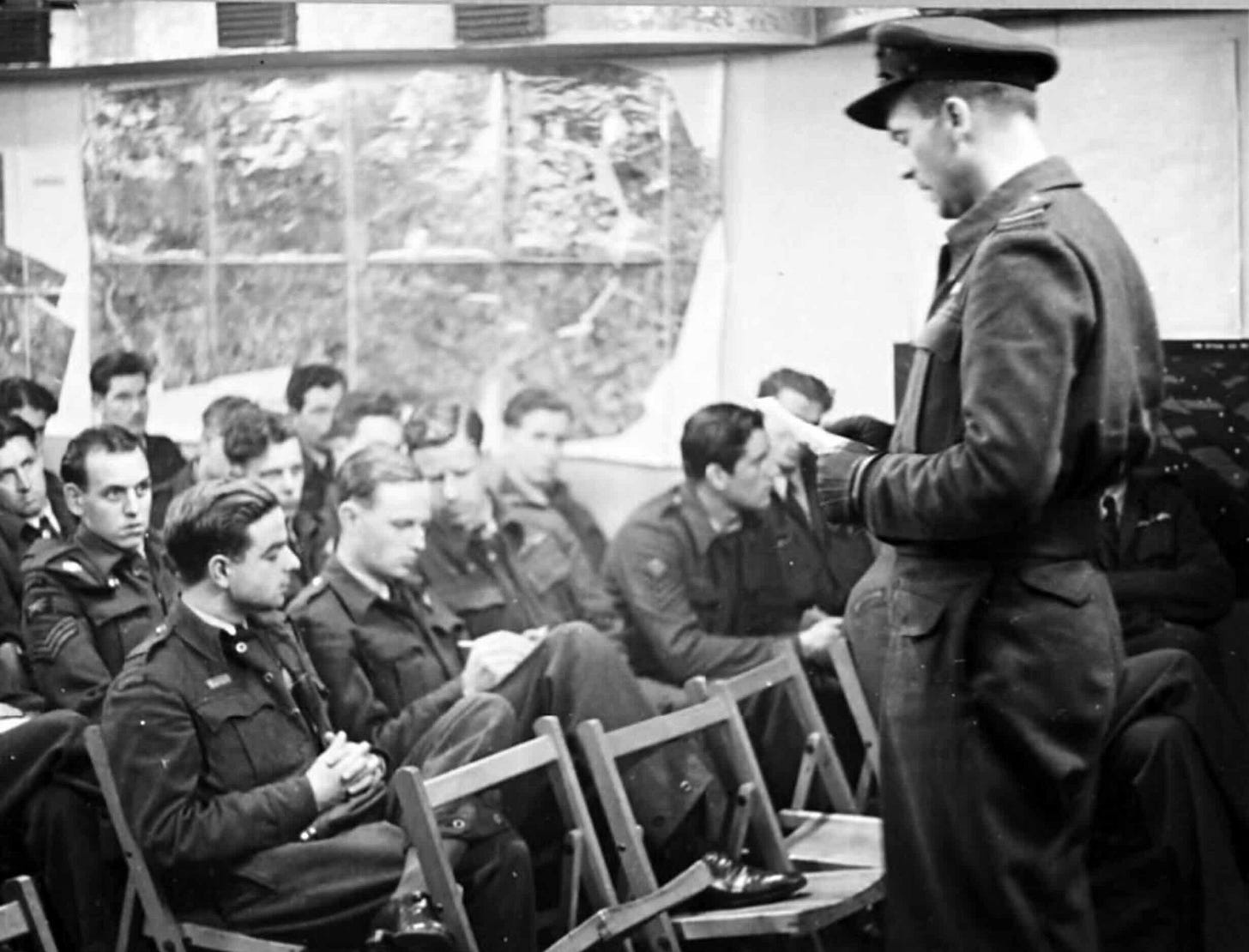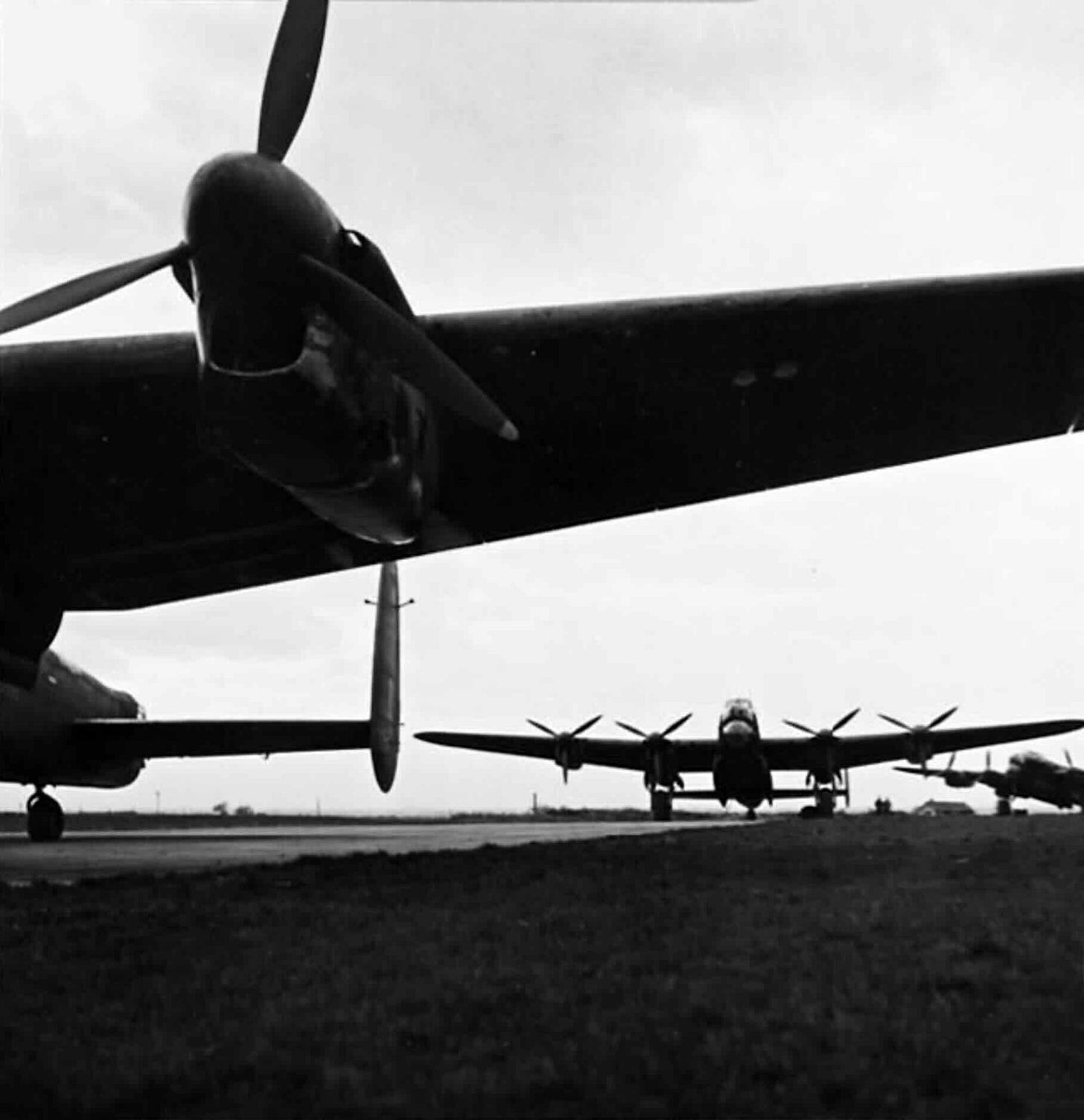'Parachute to Berlin'
An American journalist joins an RAF Lancaster bomber crew for a raid on Berlin - and survives to write a classic of war reporting

Today it seems rather extraordinary that journalists would choose to go on a bombing raid over Germany. Journalists did, and still do, take great risks to get close to the action. But nobody expected them to join the infantry for a front-line attack. Many would argue that survival was ‘just a matter of luck’ for both the infantry and for bomber crews.
When researching Ed Murrow's legendary broadcast of 3rd December 1943, I discovered several journalists had been invited along for the 2nd/3rd December raid. One of them was US journalist Lowell Bennett - a 24-year-old war correspondent of the International News Service - who was lucky to survive the raid.
Bennett had an exceptional tale to tell about his experiences, eventually told in Parachute to Berlin, published in 1945. It is a classic of war reporting - telling the broader story of the bombing campaign as well as his survival story. I have just got permission from Casemate Books for the following excerpt:
For a reporter, an amateur at the profession of aerial bombing, the tension and the expectancy were naturally at a higher pitch. Six days elapsed before the Berlin attack was carried out, and there was little to do during that time. I listened to the endless tales of furlough orgies, of “odd types,” who had been and gone in the squadron, of strange incidents in Germany’s disputed sky - they had told all the stories before but the introduction as “reporter” invited repeat performances and I learned, in fragments, the history and deeds of Number Fifty Squadron of the Royal Air Force.
The pilot who was to ferry me to Berlin was Flight Lieutenant Ian D. Bolton, a twenty-year-old Scotsman, veteran of twenty-nine missions over Europe. His age was incongruous with his skill, for he commanded one third of the Lancaster squadron of twenty-four of Britain’s heaviest bombers. His crew, with the exception of one Scots-Canadian who was the “mid-upper gunner,” all hailed from Scotland.
If they resented the fact that they would carry an operationally useless load on their next mission to Berlin, they showed it not at all. The crew had been together for nearly an entire “tour” (thirty combat flights) of missions and they were rated the best on the airfield. But Bolton, an unusually matured man for his years, threw another light on the business of being a good airman over Germany at this stage of the war.
“It’s really just a matter of luck,” he explained, “and so far we have been lucky. These Lancasters are the best the RAF has; they’ll take a lot of punishment. Some pilots have actually lost two engines [out of four] over the target and gotten home all right.
“You just have to calculate that the Germans are going to shoot down from five to ten per cent of every bomber force we send against Berlin. They throw flak up all over the sky. They can usually get a couple of hundred night fighters up, cooperating with as many searchlights. If they get you—well, you’re unlucky; you’re one of the five to ten per cent. If you get through, bomb, and get back home all right—well, then you’re one of the ninety to ninety-five per cent.”
Word was circulated amazingly quickly the day an attack was planned. Even the identity of the target became common knowledge on the airfield many hours before take-off. The ground crews who fueled and bombed up the planes, for example, guess by the number of gallons of gas and the weight of bombs they stored in the aircraft just about where it would be going that night.
They knew that an attack launched against the industrial Ruhr would mean some thirteen thousand pounds of bombs and about fifteen hundred gallons of fuel. And they knew that an attack against Berlin would require about ten thousand pounds of bombs and over eighteen hundred gallons of fuel. The more distant the target, obviously, the lighter the bomb load and the greater the fuel load. And, from long experience at preparing raids against most of Germany’s big cities, guesswork for the ground crewmen had become an almost precise science.
Briefing for the Berlin attack on December 2, 1943- the gathering together of the airmen a few hours before departure for instructions - was at 1330 hours, which indicated an early start. Aircraft captains collected in what resembled a small schoolroom in the “operations building” on the edge of the airfield.
They sat at desks - ten of them, for the squadron was contributing ten Lancasters that night—with their charts and note-books spread out before them. At the head of the room, which made it resemble even more a geography class at school, there was a large map of England and Northwest Europe and a black-board, chalked sharply with pertinent data on the coming mission.
First to speak was the civilian weatherman, a lean, thin-jowled Northcountryman who seemed, if anything, slightly bored with the whole business and more than a little dubious of the value of his information. He announced in a stingy, rasping voice that the temperature would be between thirty-three and fifty-nine degrees below zero Fahrenheit at twenty thousand feet over the target. He said there would be two weather “fronts” that would have to be crossed, one before leaving the English coast and the second over Germany.
But he could not be sure what the weather would be like over Berlin, for it was changing rapidly. It might be reasonably cloudy and so reasonably safe. Or it might be completely clear, which would help the accuracy of the bombing but would also help the capital’s defenses. We should have to take “potluck” with the weather, he concluded, scooping up his share of the charts and leaving the room.
Next to speak was the Squadron Commander, Robert MacFarlane, a twenty-nine-year-old Scot and veteran of more than sixty raids against Germany. His job was to detail the raid’s mechanics. Six hundred and sixty-one aircraft would participate, all four-engined Lancasters and Halifaxes, plus a number of Mosquitoes in the Path Finder Force (which led the attack and dropped “target indicators” for the oncoming armada). Another small force of Mosquitoes would launch a “spoof attack” southeast of Berlin to draw off some of the defenses.
Total bomb load would be nearly twenty-five hundred tons, the heaviest raid of the war against Berlin. MacFarlane, with the clarity and precision of a good business executive, emphasized that the attack would be against new areas of the German capital, areas so far almost untouched by air bombardment.
He warned that the Germans were known to be concentrating their night fighters and mobile anti-aircraft weapons around Berlin and that it would be no easy job to fight through, bomb, and fight back home again.
The route, as he traced it, led out over the North Sea, crossing the European coast over Holland, and thence swinging directly toward Berlin, along an often-used route via Hanover. After bombing, the route home led northeast, north, then a straight line back to the base.
“This is the most important target of the war, chaps,” he concluded. “Go in there and bomb hell out of them. Make everything count—then bring yourselves and your planes home again safely. Keep your eyes open for fighters. Watch for those flares they drop to light up your route. Good luck to you all.”
Then followed the mass briefing, the captain of each plane sitting at a table with his crew of six aides, explaining in detail to them what he had learned at the master briefing. Each crewman had his special interest: the navigator, the route; the bomb aimer, the color and type of target indicator; the gunners listened closely to the information about night-fighter defenses.
At 1500 hours came the special pre-mission meal, including those wartime rarities (for England): a real egg, accompanied by real bacon, and fresh milk. Although RAF flying personnel normally did not fare much better than their families in civilian life, before each mission they were provided with a special meal which, in a small way, compensated for the forthcoming tension and danger of the trip.
To this reporter, most of whose meals had been of the civilian variety in London, the egg was a real treat. But, with the meal and thoughts of the mission to come, came a return of the hunch: it was going to be a one-way trip. So I ate hastily and returned to the lounge to type a story for the next morning’s newspapers: “This is being written in case I don’t return to make a more complete report of tonight’s RAF attack against Berlin. It is based on information obtained at our preflight briefing. ...”
We were to fly in the third wave to bomb the target at 2010 hours. Two waves of Halifaxes were to bomb before us and two waves of Lancasters were to follow. The entire attack was intended to be packed into twelve minutes - the most concentrated heavy-scale air raid of the entire war.
Parachute to Berlin by Lowell Bennett first published by The Vanguard Press, New York, 1945. Copyright © 2023 Alan Bennett. Reproduced with the permission of Casemate Publishers.




